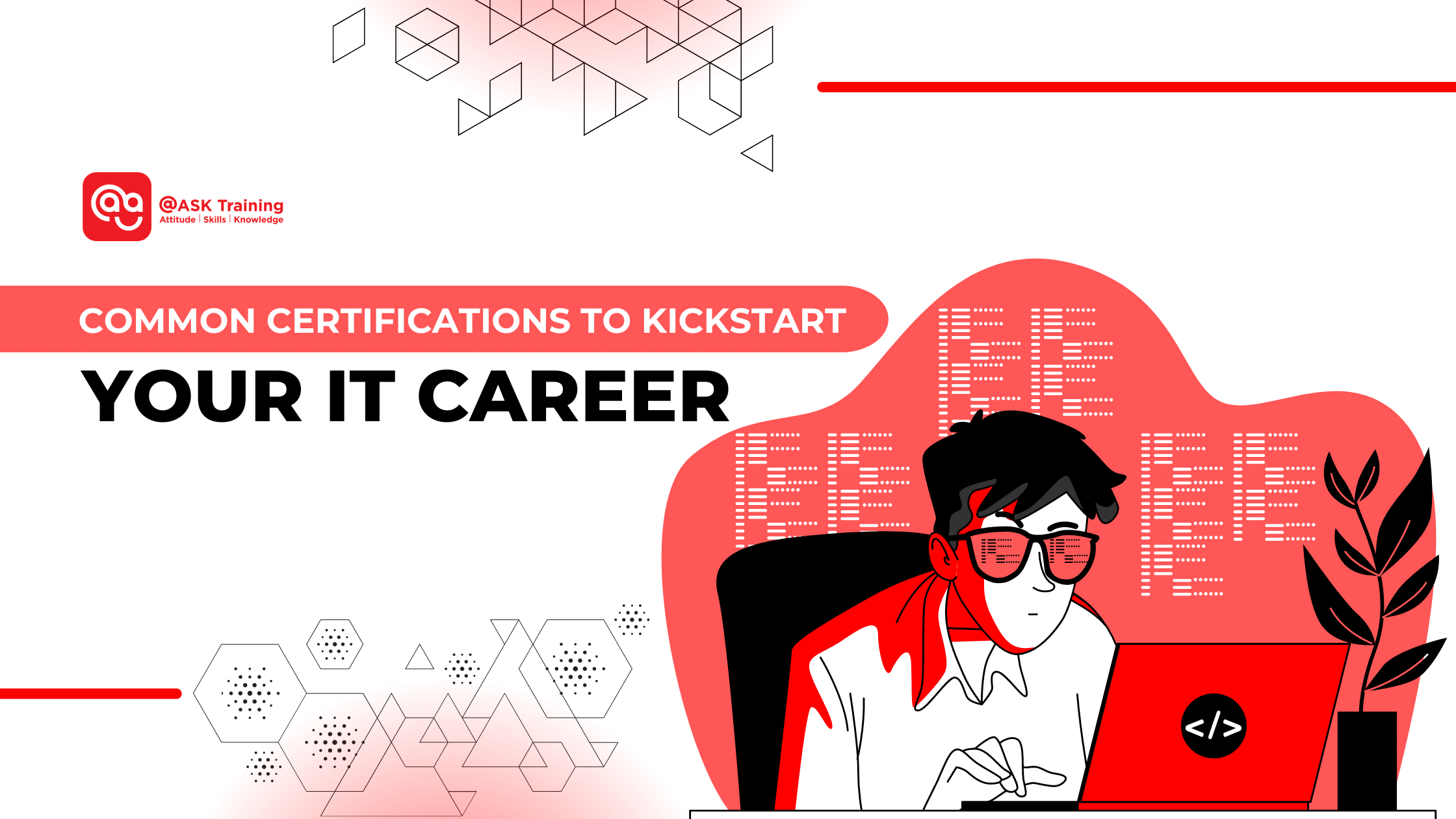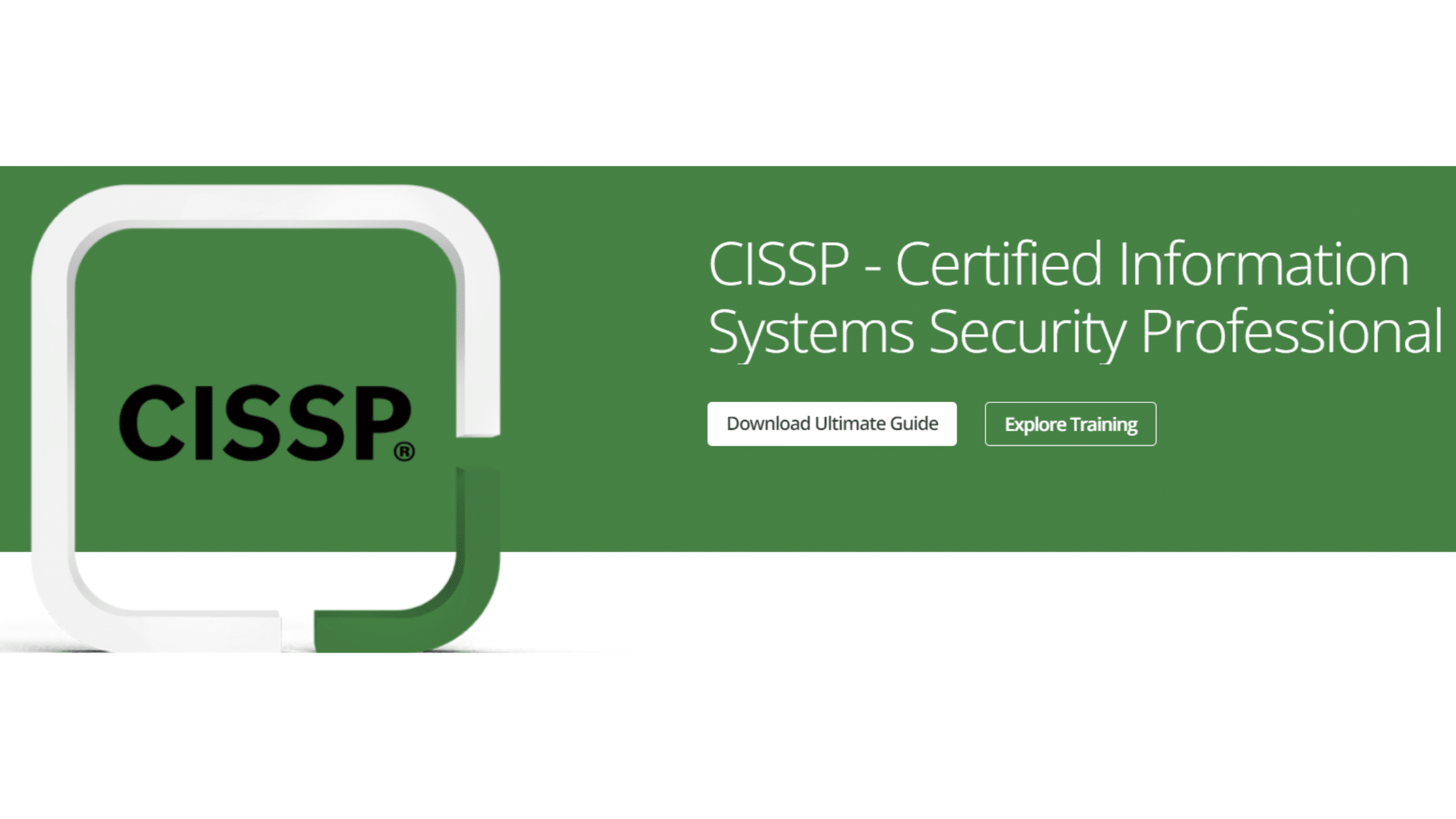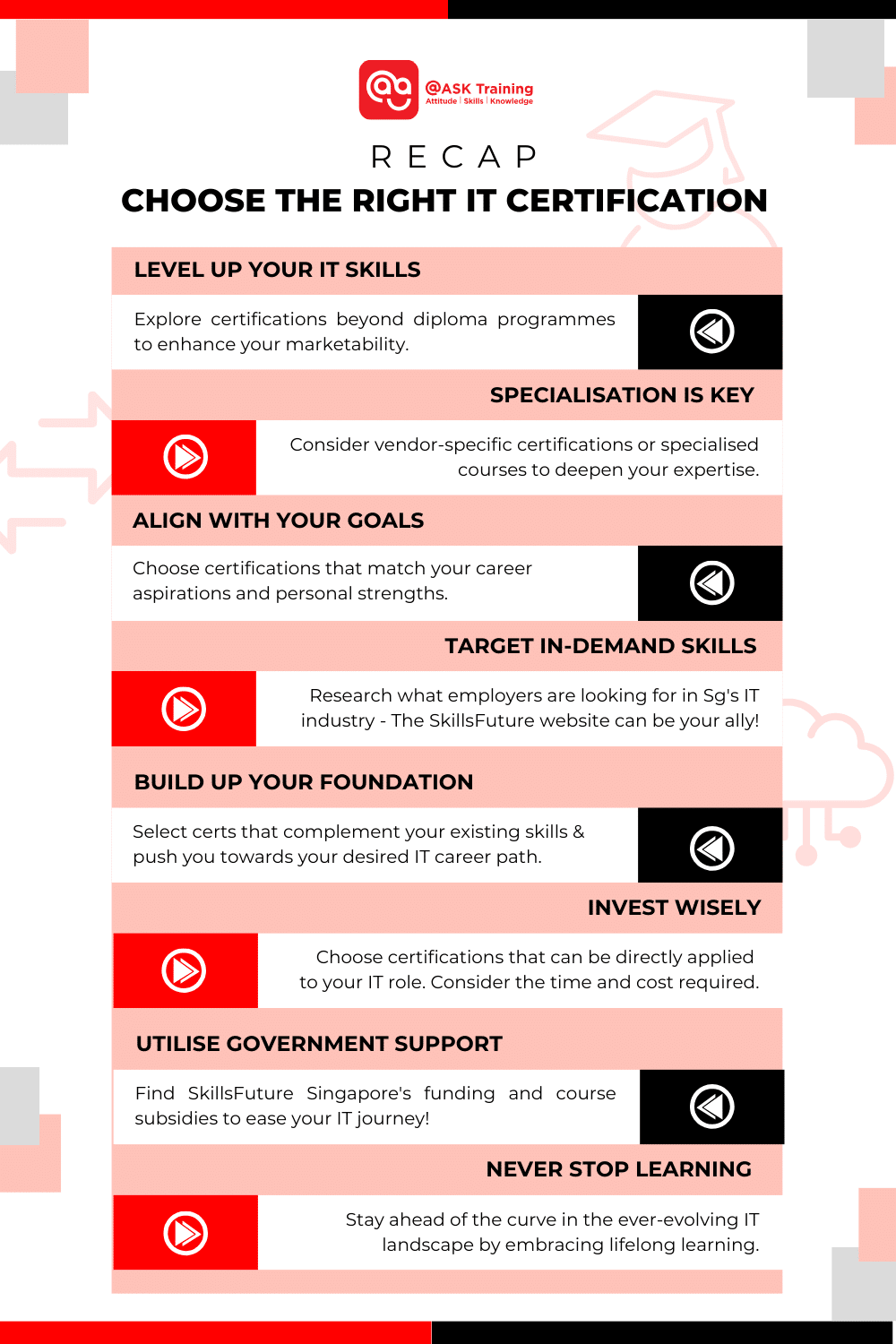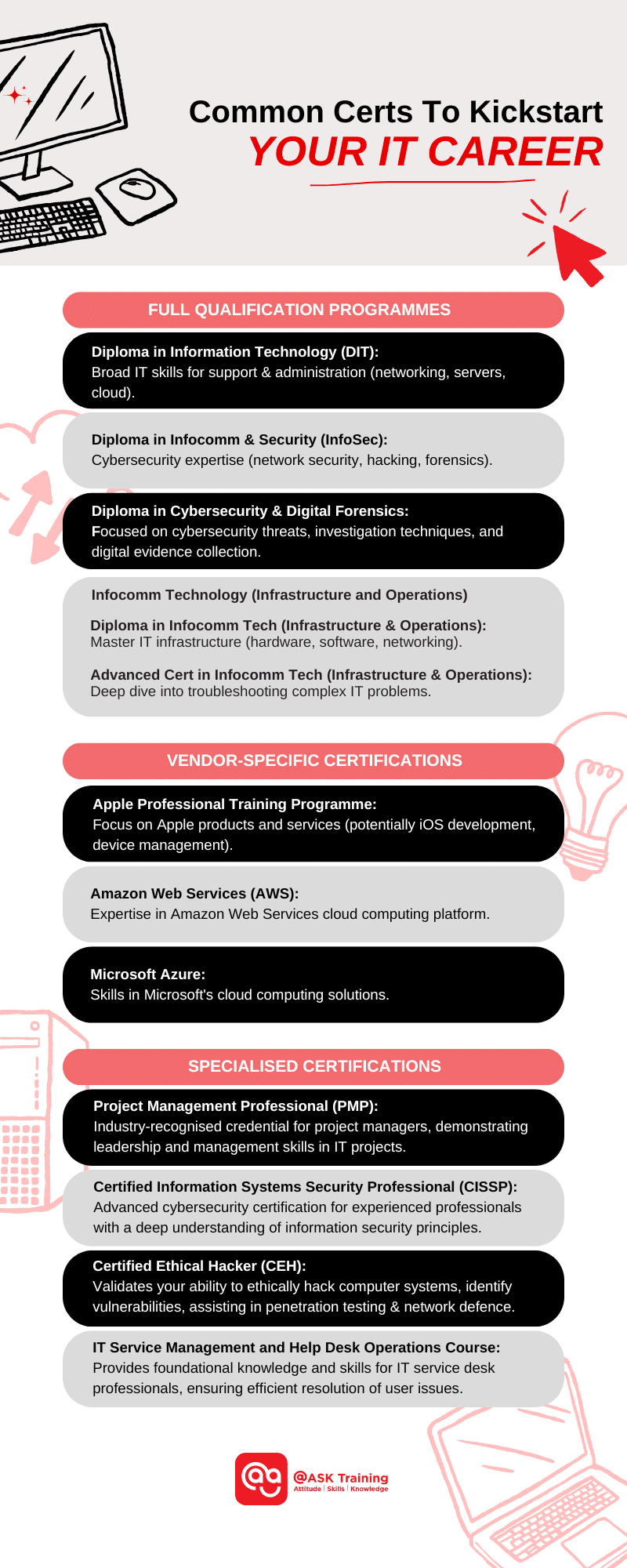 The tech world is like a fast-paced video game: new challenges emerge daily, and staying ahead of the curve is crucial. One key to levelling up your IT career is through certifications. But with Singapore’s IT industry booming, where do you even begin?
The tech world is like a fast-paced video game: new challenges emerge daily, and staying ahead of the curve is crucial. One key to levelling up your IT career is through certifications. But with Singapore’s IT industry booming, where do you even begin?
Let us start with an overview of the IT industry in Singapore to give you a rough idea.
Overview of the IT Industry in Singapore
Singapore’s IT industry is a regional powerhouse, consistently ranking among the world’s most advanced and interconnected.
Here is a glimpse into what makes it tick:
Global Connectivity: Singapore boasts world-class infrastructure, making it a prime location for tech companies and a hub for international data flow.
Smart Nation Push: The government’s “Smart Nation” initiative heavily invests in IT solutions to transform sectors like healthcare, transportation, and urban living. This creates a constant demand for skilled IT professionals.
Major Tech Players: Tech giants like Google, Facebook, and Microsoft have established a presence in Singapore, fuelling innovation and attracting further investment.
Diverse Tech Landscape: The industry goes beyond big tech companies. A thriving startup ecosystem and a strong presence of established tech firms offer a wide range of career paths for IT professionals.
Skilled Workforce Focus: The government actively promotes skills development through initiatives like SkillsFuture Singapore (SSG) and Workforce Singapore (WSG), ensuring a pipeline of qualified IT professionals to meet industry needs.
Recent reports from GovInsider, highlight the need for employers to embrace skills-based hiring practices. This shift aligns perfectly with the certifications we’ll explore, which prioritise equipping learners with the practical skills and knowledge needed to thrive in the IT sector.
Common Certifications in IT
Unlike traditional university degrees, skills-based qualifications focus on equipping you with the practical knowledge and abilities most sought-after by employers. This can take the form of certifications that validate your expertise in specific IT areas, or full qualifications like Diplomas and Advanced Certificates that provide a broader skillset. Both play a crucial role in demonstrating your readiness to thrive in IT roles within Singapore’s booming tech sector.
Building on our understanding of Singapore’s IT landscape, let’s delve into the specific qualifications that will give you a head start in your IT career journey.
Full Qualification Programmes
If you’re looking for a more comprehensive skillset, consider a Diploma or Advanced Certificate programme. These programmes offer structured learning experiences with a strong focus on practical application.
Here, we’ll explore some of the most valuable certifications and their benefits:
Diploma in Information Technology (DIT)
The DIT is the cornerstone for many aspiring IT professionals in Singapore. It provides a broad and well-rounded foundation in core IT disciplines, preparing graduates to hit the ground running in various tech fields.
What Will You Learn
This programme goes beyond the basics, providing a comprehensive curriculum that focuses on the specific skill sets sought after by Singaporean employers.
You’ll build a solid foundation in:
Software Development: Learn popular programming languages like Python, Java, or JavaScript to design, develop, and assess software applications.
Networking: Master the technology that connects everything – from local networks to the global internet. Understand network protocols, security, and administration.
Systems Administration: Gain the knowledge and skills to manage and maintain computer systems, ensuring smooth operation and user support.
Cloud Computing: Explore the ever-growing realm of cloud-based solutions, including platforms like AWS, Microsoft Azure, and Google Cloud Platform.
Cybersecurity: As cyber threats grow, the demand for cybersecurity expertise soars. Understand security principles, threat analysis, and mitigation strategies.
Data Analytics: Learn how to extract valuable insights from data, a crucial skillset for businesses of all sizes.
How Will My Career Path Look Like?
With your newly acquired knowledge and practical skills, you’ll be well-equipped for a variety of exciting careers in Singapore’s IT sector, including:
- Applications Developer: Design, develop, and maintain software applications that meet the specific needs of businesses in Singapore, from e-commerce platforms to mobile banking apps.
- Network Engineer: Design, install, configure, and maintain computer networks, ensuring optimal performance and security for Singaporean companies across various industries.
- IT Support Specialist: Provide technical assistance to users, troubleshoot problems, and maintain IT systems within organisations, ensuring smooth operation and user satisfaction.
- Business Systems Analyst: Analyse business needs and develop IT solutions that optimise operations, improve efficiency, and contribute to the success of Singaporean companies.
- Web Developer (Front-End or Back-End): Design the user interface (front-end) or develop the server-side functionality (back-end) of websites and web applications that cater to the needs of the Singaporean market.
- Data Analyst: Analyse and interpret data to extract valuable insights that can help companies in Singapore make data-driven decisions and optimise their operations.
What Type of Organisations Should I Look Out For?
Government Agencies: Singapore’s public sector is actively driving innovation. Look for IT job opportunities with the Cyber Security Agency of Singapore (CSA) to combat cyber threats, the Government Technology Agency of Singapore (GovTech) to shape the future of public services, or the Infocomm Media Development Authority (IMDA) to contribute to Singapore’s Smart Nation vision.
Multinational Corporations (MNCs): Tech giants like Google, Microsoft, and Facebook have offices in Singapore, offering exciting IT career paths.
Local Tech Powerhouses: Singapore’s startup scene is booming. Companies like Sea (Shopee, Garena), Grab, and Carousell are constantly seeking talented IT professionals.
Diploma in Infocomm & Security (InfoSec)
Singapore’s IT landscape is booming, but so are cyber threats. The Diploma in Infocomm & Security equips you to be a cybersecurity champion, combining your IT expertise with the knowledge and skills to combat cybercrime.
What Will You Learn?
This programme explores the critical intersection of information technology and cybersecurity. Here is the overview of what you will master:
Network Security: Learn how networks operate and the security measures needed to protect them. Identify vulnerabilities and develop strategies to prevent unauthorised access and data breaches.
Cryptography: Explore the art and science of secure communication. Understand encryption techniques and how they safeguard sensitive information in the digital age.
Ethical Hacking: Learn the techniques used by malicious hackers and how ethical hackers use these skills to identify and address system vulnerabilities before cybercriminals exploit them.
Vulnerability Assessment & Penetration Testing: Develop the skills to identify, assess, and exploit vulnerabilities in computer systems and networks to improve their security posture.
Simulated Cyber Attacks: Participate in simulated cyber-attacks, gaining the direct experience needed to identify and respond to real-world threats effectively.
How Will My Career Path Look Like?
With your newfound expertise, you’ll be well-positioned for a variety of exciting careers in cybersecurity, including:
- Systems and Network Security Engineer: Design, implement, and manage security solutions to safeguard networks and computer systems.
- Security Engineer/Executive: Lead the development and implementation of an organisation’s security strategy, protecting its data and infrastructure from cyber threats.
- Infrastructure Security Executive: Focus on securing the physical and virtual infrastructure that underpins an organisation’s IT systems.
- Security Analyst: Investigate cyber threats and vulnerabilities, recommending and implementing security solutions to mitigate risks.
- Application Security Engineer: Build secure applications by identifying and addressing vulnerabilities in the development process.
- Penetration Tester: Use ethical hacking skills to identify and exploit vulnerabilities in systems and networks, helping organisations strengthen their security posture.
- Security Consultant: Advise businesses on cybersecurity best practices, conducting security audits and recommending security solutions.
What Type of Organisations Should I Look Out For?
Your skills will be in high demand across various industries. Consider these organisations as you explore your career path:
Telecommunications: Singtel, DBS Bank.
Government: Government Technology Agency of Singapore (GovTech), Cyber Security Agency of Singapore (CSA).
Transportation: Singapore Airlines, Port of Singapore Authority (PSA).
Cloud & Data Centres: Amazon Web Services (AWS), Microsoft Azure, Equinix, ST Telemedia.
Financial Services: Financial institutions of all sizes.
Critical Infrastructure: Providers of essential services like power, water, and transportation
Tech Startups & E-commerce: Companies developing software applications.
Cybersecurity Consultancies: Deloitte, PwC, FireEye, Crowdstrike
Managed Security Service Providers (MSSPs): Organisations that offer outsourced cybersecurity services.
Diploma in Cybersecurity & Digital Forensics
The ever-increasing number of cyber threats has created a booming demand for cybersecurity professionals. A Diploma in Cybersecurity & Digital Forensics equips you with the specialised skills to address these challenges and launch a rewarding career in this dynamic field.
What Will You Learn?
This programme offers a comprehensive curriculum that covers both preventative and investigative aspects of cybersecurity:
Cybersecurity: Gain a solid understanding of network security concepts, system administration principles, and essential security measures to protect systems and data from unauthorised access.
Digital Forensics: Learn the art and science of collecting, analysing, and presenting digital evidence in the wake of cybercrimes. Master the use of specialised tools and techniques for data recovery, forensics analysis, and incident response procedures.
Analyse malware: Identify and understand malicious software to effectively combat cyber threats.
Recover deleted data: Master techniques for recovering critical data that may have been accidentally deleted or hidden by attackers.
Conduct security assessments: Develop the skills to conduct thorough security assessments, identifying vulnerabilities and recommending appropriate mitigation strategies.
How Will My Career Path Look Like?
This diploma prepares you for a variety of exciting career paths in cybersecurity:
- Security Analyst: Monitor and analyse network activity for potential threats, identifying and mitigating security incidents.
- Digital Forensics Investigator: Collect, analyse, and present digital evidence in legal proceedings related to cybercrimes.
- Incident Responder: Play a crucial role in containing and resolving security incidents, minimising damage, and restoring systems.
- Vulnerability Analyst: Proactively identify security weaknesses in systems and applications, recommending solutions to prevent future attacks.
What Type of Organisations Should I Look Out For?
Graduates with a Diploma in Cybersecurity & Digital Forensics are in high demand by a wide range of organisations:
Government agencies: Defend critical infrastructure and investigate cybercrimes at the national level. Examples include the Cyber Security Agency of Singapore (CSA) and the Singapore Armed Forces (SAF).
IT security firms: Provide essential cybersecurity services and solutions to businesses of all sizes.
Financial institutions: Safeguard sensitive financial data and maintain trust with clients.
Large corporations with IT security departments: Protect company assets and intellectual property from cyberattacks.
Infocomm Technology (Infrastructure and Operations) Programmes
For those seeking a comprehensive pathway into IT infrastructure management, these programmes offered by SkillsFuture Singapore-approved institutions like @ASK Training, provide a structured learning experience with a strong focus on practical skills.
Let’s take a look at what these tailored programmes are and how they can benefit you:
Diploma in Infocomm Technology (Infrastructure & Operations)
This comprehensive programme provides a broad understanding of core IT concepts, preparing you for a diverse range of IT support and administration roles.
Advanced Certificate in Infocomm Technology (Infrastructure & Operations)
This programme builds upon the knowledge gained in the Diploma programme, focusing on advanced troubleshooting techniques and complex technical problem-solving.
What Will You Learn?
Both programmes delve into a range of crucial IT infrastructure and operations topics, including:
Functions of IT Infrastructure: Gain a comprehensive understanding of how IT infrastructure underpins modern organisations, from hardware and software components to network connectivity and data management.
IT Operations Management: Explore the principles and practices of managing IT operations effectively, ensuring smooth functioning and optimal performance of IT systems.
Networking Fundamentals: Master the fundamentals of network design, configuration, and troubleshooting, equipping you to manage and maintain network infrastructure.
Server and System Administration: Learn the essential skills for administering servers and computer systems, including installation, configuration, security, and user management.
Storage and Data Management: Understand data storage technologies, data backup and recovery procedures, and best practices for data governance.
Cloud Computing: Explore the growing role of cloud computing in IT infrastructure and gain insights into cloud platforms like AWS, Azure, and Google Cloud.
IT Service Management (ITSM): Learn the principles of ITSM frameworks like ITIL, which help organisations deliver IT services effectively and efficiently.
Hands-on Lab Sessions: Gain practical experience by configuring, troubleshooting, and managing IT systems in a simulated environment.
Industry-Standard Tools: Learn to use industry-standard IT tools and software commonly employed in IT infrastructure and operations roles.
Project-Based Learning: Apply your knowledge and skills to real-world scenarios through practical projects such as the Capstone Project.
How Will My Career Path Look Like?
Upon successful completion, you’ll be well-prepared to pursue various entry-level and mid-level IT careers in areas such as:
- IT Support Specialist
- System Administrator
- Network Administrator
- Network Support Technician
- Help Desk Analyst
- IT Operations Specialist
Additionally, the Advanced Certificate can equip you for more specialised roles like:
- IT Infrastructure Specialist
- Network Security Specialist
- Cloud Support Engineer
What Are the Benefits of These Skill-Based Qualification Programmes
Time-Efficient: Allows you to gain valuable IT skills in a shorter timeframe compared to a diploma or degree programme, making it ideal for busy individuals or those seeking a quick career transition.
Cost-Effective: Offers a cost-effective way to enter the IT field compared to longer-term educational programmes. Singapore government also provides subsidies and funding to help ease their workforce to upskill or transition into the IT field.
Career Advancement Potential: This equips you with the foundational knowledge to launch your IT career and provides a stepping stone for pursuing further IT qualifications and career advancement opportunities.
If you’re a beginner without any IT background and looking to transition into this field, the Certificate in Infocomm Technology (Infrastructure & Operations) will be perfect for beginners.
Our team is ever ready to help you from the beginning of your career transition journey to offering career advice tailored to the Singaporean IT market.
Having explored the various IT certifications and diplomas, you’ve gained a solid understanding of core IT principles.
But what if you want to specialise in a particular technology or platform? The world of IT offers numerous opportunities to deepen your expertise. Let’s learn more about it in the next section.
Vendor-Specific Certifications
Having a strong foundation in IT is essential. However, as you gain experience and explore specific areas of interest, you may consider pursuing vendor-specific certifications.
These certifications validate your expertise in working with particular technologies or products offered by leading IT vendors.
In this section, we will be exploring a few popular vendor-specific certifications that would be beneficial for your specific interest:
Apple Professional Training Courses
Offered by Apple, these programmes validate your knowledge and skills in working with Apple products and technologies.
Ideal for individuals seeking to become Apple-certified technicians or developers, these courses cover a range of topics.
What Does it Cover?
You’ll gain expertise in:
- Deploying and troubleshooting macOS systems.
- Develop applications using Swift programming and understand app design principles.
- Learn how to manage Apple devices effectively through Mobile Device Management (MDM) solutions.
Benefits:
Earning an Apple certification demonstrates your in-depth understanding of the Apple ecosystem, making you a valuable asset to companies and organisations that rely heavily on Apple products, such as those in the education and creative industries.
Amazon Web Services (AWS)
As cloud computing continues to dominate the IT landscape, certifications from industry leader Amazon Web Services (AWS) are in great demand.
These programmes validate your skills in utilising various AWS services that are crucial for building and managing cloud-based solutions.
What Does It Cover?
You will utilise AWS services such as:
- Learn how to provision and manage virtual servers using EC2 (Elastic Compute Cloud).
- Store and retrieve data efficiently with S3 (Simple Storage Service)
- Leverage AWS Lambda, a serverless computing platform that allows you to run code without managing servers.
Benefits:
Earning an AWS certification positions you for success in the cloud computing field and makes you a desirable candidate for companies leveraging AWS for their IT infrastructure and applications (e-commerce, media streaming, etc.).
Microsoft Azure
Similar to AWS, Microsoft offers a comprehensive range of certifications for professionals working with their Azure cloud platform. These programmes validate your expertise in areas that are essential for building and maintaining cloud-based solutions on Microsoft Azure.
What Does It Cover?
Here are a few skills you will gain from this certification:
- Develop skills in cloud administration, including resource management and security best practices.
- Covers development aspects like Azure Functions and API design.
- Security considerations such as identity and access management.
Benefits:
Earning a Microsoft Azure certification demonstrates your proficiency in managing and utilising Microsoft’s cloud solutions, making you a strong candidate for organisations that utilise Azure in their IT strategy, such as companies in the financial services and healthcare sectors.
Google Cloud Professional Certifications
Google Cloud Professional Certifications validate your expertise in specific areas of Google Cloud Platform (GCP), Google’s suite of cloud computing services.
What Does It Cover?
Each Google Cloud Professional Certification focuses on a specific GCP domain and requires passing a rigorous exam.
The coverage varies depending on the chosen specialisation but may include:
Cloud Architect: Design principles for secure and scalable cloud solutions on GCP, resource management, networking, and cost optimisation.
Data Engineer/Specialist: Building and managing data pipelines, data processing tools like BigQuery and Cloud Dataflow, and data security on GCP.
Cloud Security Professional: Securing GCP infrastructure and application.
Benefits:
Earning these certifications demonstrates your in-depth knowledge and practical skills in your chosen area, making you a highly sought-after candidate for organisations heavily invested in GCP for their cloud infrastructure and applications.
Vendor-specific certifications provide a valuable pathway to validate your skills in working with particular technologies or platforms. But the IT field is vast, and there’s always more to learn.
In the next section, we will go further into a few specialised courses that would be beneficial for your IT career.
Specialised Courses
Specialised courses allow you to delve deeper into specific aspects of IT, expanding your knowledge base and refining your professional skillset.
Below are some examples of specialised courses that can benefit IT professionals looking to advance their careers:
Project Management Professional (PMP)
The PMP certification is widely recognised as a top qualification for project managers in various industries, including IT. Earning your PMP demonstrates your competence in initiating, planning, executing, monitoring, and closing projects effectively.
Ideal for:
- IT professionals who manage complex IT projects and require a structured approach to ensure successful delivery.
- Individuals seeking career advancement into project management roles within the IT field.
Certified Information Systems Security Professional (CISSP)
The CISSP certification is one of the top standards for cybersecurity professionals. Achieving the CISSP demonstrates extensive knowledge and expertise across various cybersecurity domains.
The exam covers the CISSP Common Body of Knowledge (CBK), a comprehensive framework encompassing eight core domains of cybersecurity:
- Security and Risk Management
- Asset Security
- Security Architecture and Engineering
- Communication and Network Security
- Identity and Access Management (IAM)
- Security Assessment and Testing
- Security Operations
- Software Development Security
Ideal for Cybersecurity Professionals, the CISSP certification is particularly well-suited for experienced cybersecurity professionals seeking to:
- Validate Their Expertise: Demonstrate a comprehensive understanding of cybersecurity best practices and a broad range of security domains.
- Advance Their Careers: Qualify for senior security positions that often require or highly value CISSP certification.
- Become Industry Leaders: Earning the CISSP signifies dedication to the field and positions you as a highly qualified and respected cybersecurity professional.
Certified Ethical Hacker (CEH)
The Certified Ethical Hacker (CEH) certification focuses on ethical hacking techniques and methodologies. This course equips you with the knowledge and skills employed by ethical hackers to identify and exploit vulnerabilities within computer systems and networks.
By understanding how malicious hackers operate, you can learn to proactively identify and address security weaknesses before they can be exploited.
Earning your CEH certification demonstrates your ability to conduct penetration testing, identify system vulnerabilities, and recommend appropriate security measures to improve the overall security posture of an organisation.
Ideal for:
- Cybersecurity professionals who are responsible for assessing and improving the security posture of organisations.
- Security analysts, penetration testers, and security consultants can all benefit from the comprehensive ethical hacking skills and knowledge gained through this programme.
IT Service Management and Help Desk Operations Course
The IT Service Management (ITSM) and Help Desk Operations specialised course dives into the industry standard framework, covering best practices for managing IT services effectively and resolving user issues efficiently.
Expect to gain a comprehensive understanding of key ITSM concepts, including:
- ITIL Framework: Learn the core principles and processes outlined in the IT Infrastructure Library (ITIL) framework, the foundation for effective ITSM.
- Service Desk Management: Master the essential skills for managing a service desk, including incident resolution procedures, service request fulfilment, and user communication strategies.
- IT Asset Management: Gain insights into effectively tracking and managing IT assets throughout their lifecycle.
This course is designed for IT professionals seeking to:
- Refine Existing Skills: Enhance their knowledge and capabilities in ITSM best practices and help desk operations.
- Transition into Help Desk Roles: Individuals aspiring to work in a help desk environment can gain the foundational knowledge and skills to excel in this crucial IT support function.
- Advance in IT Service Management: IT professionals seeking career advancement within the ITSM field can leverage this course to solidify their understanding of best practices.
On another note, you can also consider enrolling with @ASK Training. Find out if our IT Service Management and Help Desk Operations course aligns with your learning objectives!
Having explored the vast landscape of IT diplomas, vendor-specific certifications, and specialised courses, you might be wondering – “Which one is right for me?”.
Let’s explore further in the next section.
Factors to Consider When Choosing Certifications
Selecting the most impactful IT certifications can feel overwhelming, but fret not! By considering a few key factors, you can make an informed decision that propels your IT career forward in Singapore.
1. Personal Interests and Career Goals
Align with Long-Term Aspirations
The most important factor is aligning your chosen certifications with your long-term career objectives.
Do you dream of becoming a cloud architect, a cybersecurity specialist, or a project management guru?
Research certifications that pave the way for your desired career path.
Match Your Strengths and Passions
IT is a diverse field, so leverage your natural strengths and interests when selecting certifications.
Are you analytical and detail-oriented? Security certifications might be a perfect fit. Do you enjoy problem-solving and innovation?
Cloud computing certifications could open exciting doors. Choose a path that ignites your passion for technology!
2. Job Market Demand in Singapore
Research In-Demand Skills
The Singaporean IT industry thrives on innovation and cutting-edge technology. Stay ahead of the curve by researching certifications aligned with in-demand skills.
Resources like the MySkillsFuture website can provide valuable insights into Singapore’s current and future IT workforce needs.
Targeted Approach for Employability
Consider obtaining certifications that are currently in high demand among employers in Singapore.
Many job postings will explicitly mention preferred certifications, so tailor your choices to increase your employability in the competitive IT landscape.
3. Relevance To Current Jobs or Desired Career Path
Complementary Skills and Career Path
Select certifications that complement your current skillset and push you towards your desired career path.
If you’re a network administrator, a cloud computing certification can enhance your abilities and broaden your career options.
For aspiring IT project managers, a PMP certification can significantly validate your leadership and management skills.
Adding Value Through Expertise
Ensure the chosen certifications add value to your professional development. Don’t just chase trendy certifications; choose those that equip you with practical skills and in-depth knowledge that can be directly applied in your current or future IT role.
4. Cost and Time Investment
Budget and Time Considerations
Be realistic about the time and financial investment required for certification preparation.
Some certifications involve rigorous exams and extensive training materials, while others may offer a more streamlined approach.
Evaluate your budget constraints and time availability before committing to a particular certification.
Government Initiatives and Funding
The Singaporean government actively supports its workforce through skills development initiatives. Government bodies such as SkillsFuture Singapore offer funding and course subsidies to help Singaporeans acquire in-demand skills, including those relevant to the IT industry.
Explore these resources to find financial aid and training opportunities that can empower you on your IT career journey!
Here’s a helpful recap on how you can choose the right IT Certification to start your IT journey in Singapore:
Ready to Take On the IT World?
The world of IT certifications might seem vast, but with the right approach, it can be an exciting adventure that propels your career forward! Remember, certifications validate your skills and open doors to new opportunities.
By considering the factors we discussed and conducting thorough research, you can choose the certifications that perfectly align with your interests, goals, and the dynamic Singaporean IT market.
So, what are you waiting for? Start exploring the exciting world of IT certifications today!
With dedication and the right choices, you’ll be well on your way to a successful and fulfilling IT career in Singapore. Here’s a summary of all the IT Certifications we’ve mentioned:
Don’t forget to check @ASK Training’s various IT certifications, full-time and individual programmes, that might suit your learning needs and career goals! Our programmes are also eligible for up to 95% SkillsFuture funding.
Plus, initiatives such as the SkillsFuture Career Transition Programme (SCTP) can provide financial assistance for Singaporeans looking to upskill or switch careers.
Explore our range of IT courses such as:
- Certificate in Infocomm Technology (Infrastructure and Operations)
- Advanced Certificate in Infocomm Technology (Infrastructure and Operations)
- Diploma in Infocomm Technology (Infrastructure and Operations)
Good luck and here’s to a great start towards your IT career!













